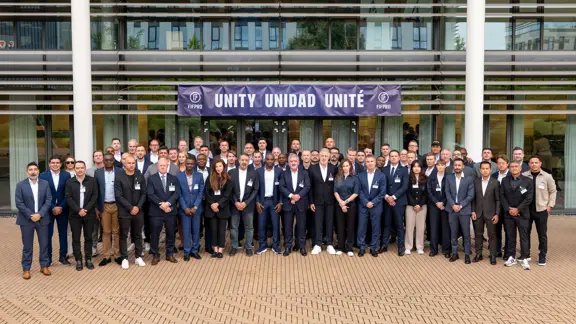Statement
In defence of players, FIFPRO denounces FIFA's autocratic governance

At a meeting today near Amsterdam with the participation of 58 player unions from around the world, FIFPRO expressed its deepening concern over the way FIFA is currently managing global football.
At the same time, FIFPRO reaffirmed its unwavering commitment to protecting the rights of men and women players – rights which are being seriously undermined by commercial policies imposed by its autocratic system of governance.
The overloaded match calendar, the lack of adequate physical and mental recovery periods, extreme playing conditions, the absence of meaningful dialogue, and the ongoing disregard for players’ social rights have regrettably become pillars of FIFA’s business model; this is a model that puts the health of players at risk and sidelines those at the heart of the game.
As an international trade union, FIFPRO firmly believes there can be no ‘new era’ for football without first addressing the structural inequalities and systemic abuses embedded in the game. There can be no legitimate spectacle built on fatigue, exclusion, and exploitation.
FIFA continues to systematically ignore and silence the real issues players face in different parts of the world. It is unacceptable for an organisation that claims global leadership to turn a blind eye to the basic needs of the players.
One clear example of this disconnect was the recent Club World Cup, celebrated by President Infantino despite being held under conditions that were extreme and inappropriate for any human being, demonstrating a troubling insensitivity to human rights, even when it concerns elite athletes.
Likewise, FIFA’s recent announcement boasting an expected six million ticket sales for the next World Cup once again places the focus solely on commercial metrics, while ignoring the structural hardship that defines much of global football. Does FIFA know how much a player earns in Africa? Is it aware that in many parts of the world it is common for salaries to go unpaid for weeks at a time?
FIFPRO is not opposed to the economic growth or commercial development of the game. On the contrary, we believe such growth must be rooted in principles of fairness, respect, and accountability toward those who make football possible with their talent and effort: the players.
Now more than ever, FIFPRO and its 72 affiliated unions reaffirm their unwavering commitment to defending the labour, social, and human rights of footballers worldwide. We will continue to speak out against abuse and demand fair, dignified, and sustainable conditions for all players. Football needs responsible leadership, not emperors. It needs fewer autocratic monologues and more genuine, inclusive, and transparent dialogue.
Unions Present
Angola, Argentina, Australia, Austria, Bosnia and Herzegovina, Bulgaria, Cameroon, Canada, Chile, Colombia, Congo DR, Costa Rica, Croatia, Cyprus, Czechia, Egypt, England, Finland, France, Gabon, Ghana, Greece, Guatemala, Honduras, India, Indonesia, Ireland, Israel, Italy, Japan, Kenya, Korea Republic, Lithuania, Malaysia, Malta, Montenegro, Netherlands, New Zealand, North Macedonia, Northern Ireland, Norway, Panama, Paraguay, Peru, Poland, Portugal, Romania, Scotland, Serbia, Slovakia, Sweden, Türkiye, Ukraine, United States of America, Uruguay, Uzbekistan, Venezuela, Zimbabwe.
Adherents
Belgium, Bolivia, Botswana, Denmark, Hungary, Iceland, Morocco, Qatar, Slovenia, South Africa, Zambia.
Today, unions from around the world stand side by side to send a clear message: the global voice of football players is strong and united.
— FIFPRO (@FIFPRO) July 25, 2025
UNITY UNIDAD UNITÉ pic.twitter.com/8cwGIXiUNS
